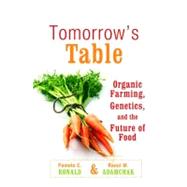
What is included with this book?
| Foreword | p. vii |
| About the Authors | p. xvii |
| Introduction | |
| Cultivating Rice in Nihe, China and Davis, California (Pam) | p. 3 |
| The Farm | |
| Why Organic Agriculture? (Raoul) | p. 13 |
| The Tools of Organic Agriculture (Raoul) | p. 29 |
| The Lab | |
| The Tools of Genetic Engineering (Pam) | p. 43 |
| Consumers | |
| Legislating Lunch (Pam) | p. 63 |
| Who Can We Trust? (Pam) | p. 81 |
| Is GE Food Risky to Eat? (Pam) | p. 85 |
| The Environment | |
| Conserving Wildlands (Pam) | p. 105 |
| Weeds, Gene Flow, and the Environment (Pam) | p. 115 |
| Ownership | |
| Who Owns the Seed? (Raoul) | p. 127 |
| Who Owns the Genes? (Pam) | p. 137 |
| Dinner | |
| Deconstructing Dinner: Genetically Engineerd, Organically Grown (Pam & Raoul) | p. 155 |
| Glossary | p. 169 |
| References | p. 179 |
| Index | p. 199 |
| Table of Contents provided by Ingram. All Rights Reserved. |
The New copy of this book will include any supplemental materials advertised. Please check the title of the book to determine if it should include any access cards, study guides, lab manuals, CDs, etc.
The Used, Rental and eBook copies of this book are not guaranteed to include any supplemental materials. Typically, only the book itself is included. This is true even if the title states it includes any access cards, study guides, lab manuals, CDs, etc.